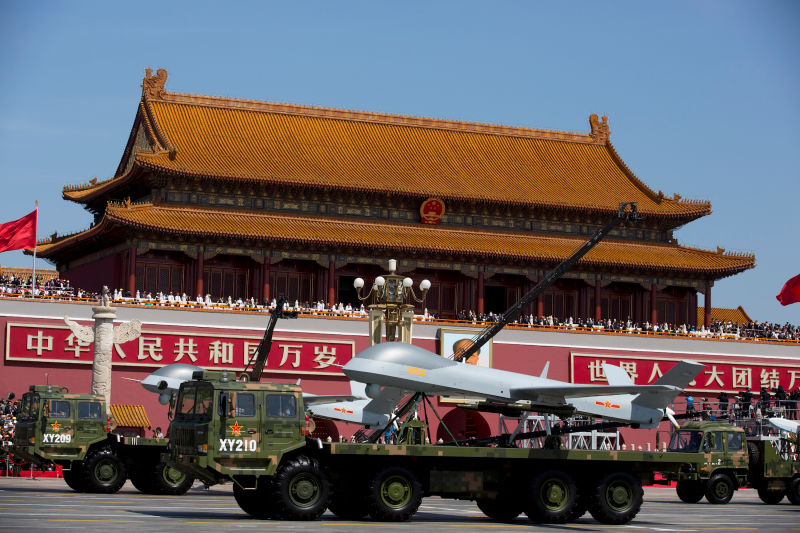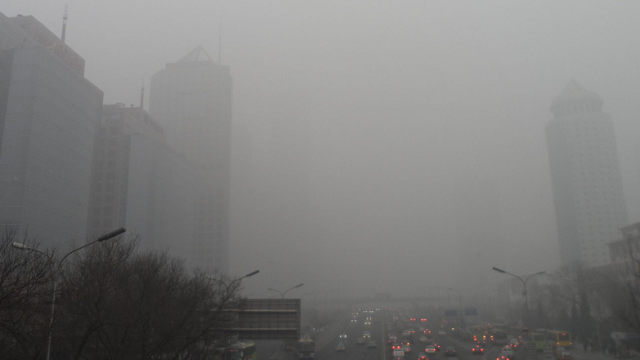It’s no coincidence that the China’s capital city had clear, sunny skies for the country’s huge military parade last week, or that Beijing’s dense smog returned the very next day. The Chinese government took extreme measures to guarantee clear skies for the its display, but it took less than 24 hours for air pollution to ramp up again afterward.
Last month, Chinese officials set a goal: reduce air pollution in Beijing by 40% to cut pollution in neighbouring cities by 30% — not as a long-term environmental plan, mind you, but as a short-term move to ensure clear skies for a military parade. China held a massive military parade on Sept. 4, marking the 70th anniversary of the end of World War Two, and officials wanted clear skies for the event.
So they partially shut the capital city down in the weeks leading up to the parade, starting around Aug. 20. China shut down between 10,000 and 12,000 factories in Beijing and neighbouring cities. That included nearly every steel mill in Beijing and the nearby cities of Hebei and Tianjin, which, according to the Guardian, accounted for about 6.6 million tons of lost production. 40,000 construction sites in and around Beijing also shut down for the duration.
China took four out of five government vehicles in Beijing off the road, and only half of the five million private cars registered in Beijing were allowed to drive on any given day. Drivers were assigned alternating days, depending on whether they had even-numbered or odd-numbered licence plates.
“Parade Blue” Skies
The drastic measures actually worked. Beijing is one of the smoggiest cities in the world, but for fifteen days, culminating in the day of the parade — Thursday, Sept. 3 — Beijing’s skies cleared.

FRED DUFOUR/AFP/Getty Images
Its air quality improved significantly, based on the air quality index (AQI), a standard used to describe the amount of air pollution in an area. The scale runs from 0 to 500, divided into six colour-coded categories. On parade day, the U.S. embassy in Beijing reported an AQI of about 17, which is well within the “green” range of 0 to 50 that denotes the healthiest, least polluted air on the AQI scale.
Locals dubbed the phenomenon of sunny skies “parade blue.” Beijing residents seem to have enjoyed the clear skies while they lasted, but the tongue-in-cheek phrase shows that they understood exactly why they were briefly treated to improved skyline views and strangely breathable air. CNN reported on Friday that Chinese authorities might have taken offence to the phrase and censored it on Chinese social media sites like Weibo, since they could find only three posts using the phrase on Friday.
Residents of Beijing are apparently used to this sort of thing, however. Another wry phrase, “APEC blue,” has been part of Beijing vernacular since November 2014. Officials enacted similar measures when Beijing hosted the two week long Asia-Pacific Economic Cooperation (APEC) summit, closing factories and restricting driving. Just like the parade preparations, it worked — temporarily. And locals quickly coined a phrase. CNN’s Shen LU and Wilfred Chan wrote,
“As a rueful joke, Chinese Internet users began using ‘APEC blue’ as a phrase to describe something beautiful that disappears quickly. For example, a quip about short-lived relationships: ‘He’s not really into you. It’s APEC blue!’”
Temporary Reprieve
At midnight on Friday, the restrictions lifted. Traffic flooded the streets, factories reopened, and it didn’t take long for the smog to return.
“The air quality index started to deteriorate last night and stood at about 150 throughout Friday morning,” reported the South China Morning Post on Friday, Sept. 4, less than 24 hours after the big parade. At 11:00 AM on Friday, the U.S. embassy reported an AQI of 158, and in some parts of the city it climbed past 160. That’s within the “red” zone of 151 to 200 on the AQI scale, which the EPA says means that “Everyone may begin to experience some adverse health effects, and members of the sensitive groups may experience more serious effects.”
As of 11 AM local time on Sunday morning, the average AQI in Beijing is 53, though it was as high as 74 in some parts of the city and as low as 34 in others. That’s probably what Beijing residents can expect on most days, at least until the Chinese government cleans up for the next big event.
Top image: 螺钉 via Wikimedia Commons
